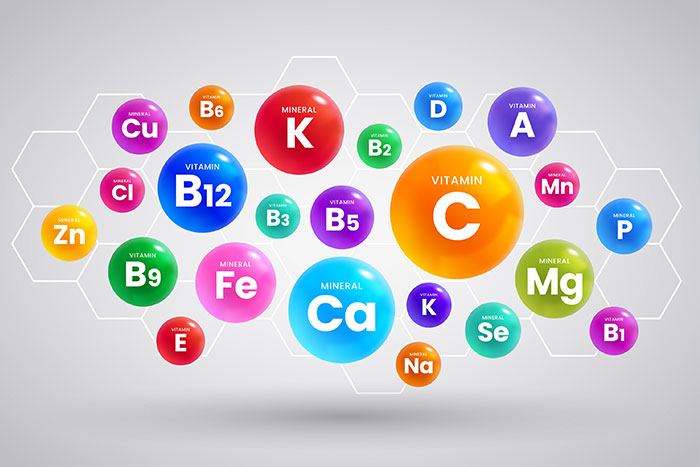
These additives are essential for poultry health and productivity. They include calcium, phosphorus, vitamin D, and others.
Minerals and vitamins are essential components of poultry feed, as they play a crucial role in supporting the overall health, growth, and production of poultry. Proper mineral and vitamin supplementation in poultry feed is necessary to prevent nutritional deficiencies and promote optimal performance. Here are some of the key minerals and vitamins commonly added to poultry feed:
Minerals:
- Calcium (Ca): Calcium is vital for strong bones, eggshell formation, and muscle function. Laying hens, in particular, require significant amounts of calcium to produce high-quality eggshells.
- Phosphorus (P): Phosphorus is necessary for bone development, energy metabolism, and overall growth. The balance between calcium and phosphorus is crucial forproper bone health in poultry.
- Sodium (Na): Sodium helps regulate body fluids and osmotic balance in poultry. It is often provided in the form of salt (sodium chloride) in feed.
- Potassium (K): Potassium plays a role in muscle and nerve function, and it helps maintain electrolyte balance.
- Magnesium (Mg): Magnesium is important for enzyme function, muscle contraction, and nerve transmission in poultry.
- Iron (Fe): Iron is essential for hemoglobin production, which is crucial for transporting oxygen in the blood.
- Copper (Cu): Copper is necessary for enzyme function and the formation of connective tissues.
- Zinc (Zn): Zinc is involved in the immune system, skin and feather development, and overall health in poultry.
- Manganese (Mn): Manganese supports bone development and reproductive health in poultry.
- Selenium (Se): Selenium is essential for antioxidant function, immune response, and overall health.
Vitamins:
- Vitamin A: Vitamin A is important for vision, reproduction, and the immune system in poultry.
- Vitamin D: Vitamin D is essential for calcium absorption, bone development, and overall health, particularly in layers.
- Vitamin E: Vitamin E is an antioxidant that protects cells and helps maintain muscle and immune system function.
- Vitamin K: Vitamin K is important for blood clotting in poultry.
- Vitamin B-complex: This group of vitamins, including B1 (thiamine), B2 (riboflavin), B3 (niacin), B5 (pantothenic acid), B6 (pyridoxine), B7 (biotin), B9 (folate), and B12 (cobalamin), supports various metabolic processes, energy production, and feather development.
- Vitamin C (ascorbic acid): Vitamin C has antioxidant properties and is involved in collagen production.
- Choline: Choline is necessary for fat metabolism and liver function in poultry.
- Folate: Folate is important for cell division and the synthesis of DNA and RNA.
Mineral and vitamin supplementation is carefully considered in poultry feed formulations to meet the specific needs of different poultry types (e.g., broilers, layers, turkeys) and to ensure balanced nutrition at various stages of development. A balanced diet with the right combination of minerals and vitamins is essential for optimizing poultry growth, production, and overall health while preventing nutritional deficiencies
